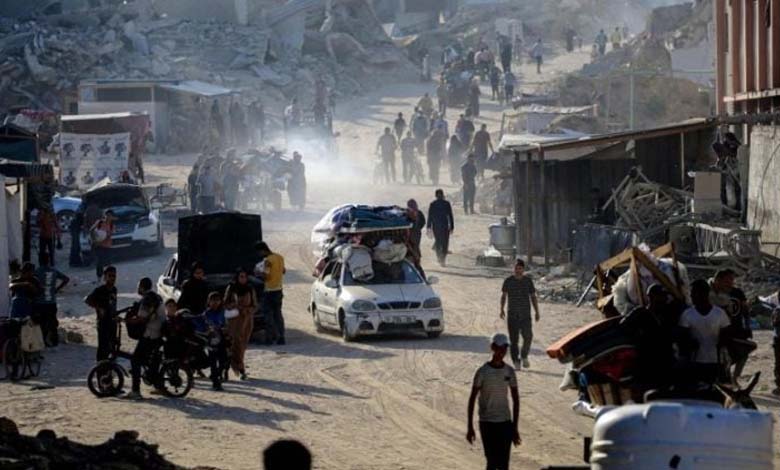The Israeli Dilemma… Who Governs Gaza After the War?

Israel has faced a dilemma for which it has not found a radical solution since the beginning of the Gaza crisis nine months ago: the arrangements for the day after the war.
Israel’s proposed plan for post-war Gaza, in collaboration with influential local tribes, relies on US allies.
However, the problem lies in the fact that no one wants to be seen talking to “the enemy” while Hamas maintains strong influence despite Tel Aviv’s efforts to eliminate its capabilities.
Israel is under pressure from Washington to stop the loss of human lives and its military operations after nearly nine months, but it does not want Hamas to take responsibility after the war.
Thus, Israeli officials are trying to chart a path for post-ceasefire.
According to public statements by senior Israeli officials, one of the fundamental pillars of the plan is the formation of an alternative civilian administration including local Palestinian entities that are not part of existing power structures and are willing to work with Israel.
However, the only reasonable candidates in Gaza for this role, the heads of influential local tribes, are unwilling to participate, according to discussions conducted by Reuters with five members of major Gaza tribes, one of whom is a tribal leader.
Tahani Mustafa, a leading analyst of Palestinian affairs at the Brussels-based think tank International Crisis Group, said Israel is “desperately looking for tribes and local families on the ground to work with them… and they are refusing”.
According to Tahani, who has contacts with some families and other local stakeholders in Gaza, the tribes do not want to participate, partly out of fear of “Hamas retaliation”.
This threat is real because, “despite Israel’s stated goal in the war to destroy Hamas, the movement still has active militants who impose their will on the streets of Gaza,” according to six residents interviewed by Reuters.
In response to a question about the outcome for any influential tribal leader in Gaza if he collaborates with Israel, Ismail al-Thawabta, head of Hamas‘s press office in Gaza, said, “I expect the response to be fatal for any tribe or entity that agrees to implement the occupation’s plans. I expect the response to be fatal.”
Israeli Prime Minister Benjamin Netanyahu acknowledged the challenges last week, stating in an interview with Israeli television channel Channel 14 that the Ministry of Defense had already attempted to contact tribes in Gaza but “Hamas put an end to these attempts”.
He added that the Ministry of Defense has a new plan but provided no details other than mentioning that he did not want to involve the Palestinian Authority currently governing the occupied West Bank.
Reuters could not confirm if Israeli efforts to work with the tribes are ongoing.
Israeli Defense Minister Yoav Galant discussed post-war plans during a meeting in Washington last week with US officials.
Galant said at a press conference during the visit, “The only solution for Gaza’s future is for local Palestinians to run it. Israel doesn’t need to do it, and Hamas doesn’t need to do it.” The tribes were not specifically mentioned.
Israel launched its attack on Gaza in response to a Hamas-led attack on October 7 last year that killed 1,200 people, mostly civilians, and took about 250 hostages according to Israeli figures.
Palestinian health authorities say Israel’s ground and air campaign against Gaza has killed about 38,000 people, most of them civilians. Israel claims many of those killed are Palestinian fighters.
Powerful tribes In Gaza, dozens of influential families operate as efficiently organized tribes. Many of them have no official ties to Hamas. Tribes derive their strength from controlling economic activities and enjoy the loyalty of hundreds or thousands of relatives. Each family has a leader called “the elected”.
British colonial leaders in Palestine before the establishment of the State of Israel in 1948 largely relied on these leaders (the elected) to govern. After taking control of Gaza in 2007, Hamas reduced the power of tribes. But these tribes retained some independence.
Israel is already talking to some traders in Gaza to coordinate commercial shipments through a checkpoint in the south. Residents hesitate to reveal any contact with Israel.
A tribal leader in Gaza, who asked not to be named, said Israeli officials had contacted other leaders but not him in recent weeks. He learned this because the recipients of the calls informed him.
He added that Israeli officials “wanted respected and influential people” to help deliver aid to northern Gaza. He added, “I expect all tribal leaders and the elected to refuse these maneuvers” due to Israel’s anger over its attack that resulted in the deaths of tribal members and the destruction of properties.
The person whose tribe plays a key role in agriculture and importation in Gaza has no official ties to Hamas.
In another contact between Israel and influential people in Gaza, officials from the Israeli Ministry of Defense contacted two leading businessmen in the food sector in Gaza over the past two weeks, according to a well-informed Palestinian source on the contacts.
It was not clear what the Israeli side wanted to discuss. Businessmen from northern Gaza refused to deal with Israelis, according to the source.
A prominent member of another tribe said Israeli officials had not contacted his tribe, but they would find only refusal if they did.
The tribe member with no official ties to Hamas told Reuters, “We are not spies, and Israel must stop these tricks”.












